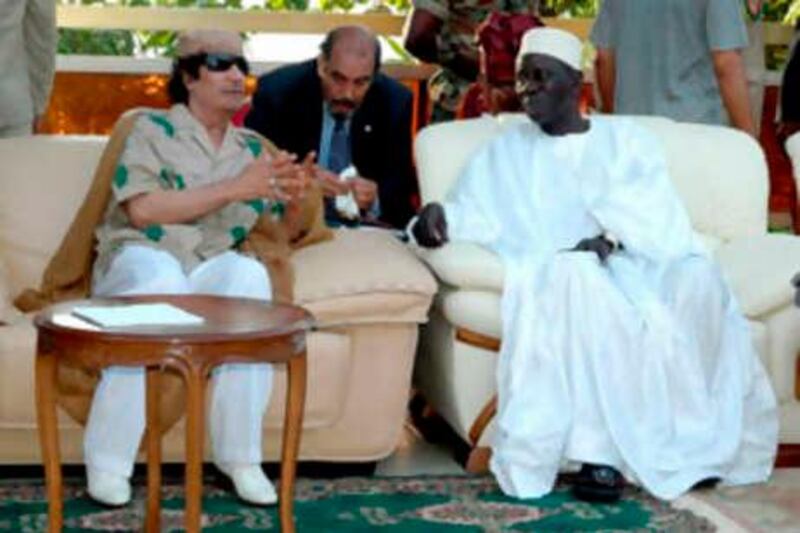DAKAR // Guineans are accustomed to living in limbo. For years they have known their ailing president, Lansana Conté, one of Africa's remaining "Big Men", was dying. They knew that for as long as he ruled, Guinea would never wrench itself from the clutches of poverty. They knew other West Africans regarded their country as a blemish on what might otherwise be an increasingly transparent political landscape.
But they did not know what would happen when he died. Three days after the death of Conté, it is still unclear who is in control of the mineral-rich country. Yesterday, lorries and tanks armed with rocket launchers rolled through the dusty streets of the coastal capital and state-run radio played military music. Leaders of the military-led group that attempted to seize control of the country after Conté's death have announced an interim government and said presidential elections will be held within two years - although on Tuesday they had promised elections within two months.
The military officers who staged the coup said they had installed as president Captain Moussa Dadis Camara, a little-known army officer who had earlier appeared on television as the junta's chief spokesman. The junta, which calls itself the National Council for Democracy and Development, instituted a curfew of 8pm for Conakry. The Conté family announced the funeral would be tomorrow. But the prime minister, Ahmed Tidiane Souaré, maintains he is in control. The government "is not dissolved", Mr Souaré said on public radio. "We are working to organise the funeral [of Conté] and we appeal to the understanding and compassion of all Guineans, especially the military."
Plagued by rampant inflation and corruption, Guinea has been on a downwards spiral for decades. From the mountains and mud banks to the fabled highland forests of the interior, the cost of living has hit an all-time high. The country has more reserves of bauxite, used to produce aluminium, than anywhere else in the world. It also has iron ore, gold and diamonds, and a stunning landscape that could be a hiker's dream. But running water and electricity have long been in short supply. Transparency International has ranked Guinea as the sixth most corrupt country in the world, and despite untapped mineral reserves, the country has a per-capita income of US $370 (Dh1,340) a year.
The capital, Conakry, was once nicknamed the Paris of Africa. A stone's throw from the presidential palace, which housed Conté's fleet of shiny Hummers and Mercedes-Benz, children grow up in poverty. Streams of thick white sewage criss-cross the dusty red streets. Alongside poverty, instability and unemployment, the only thing having increased in recent years is discontent. So the news of the attempted coup came as no surprise to Guinea's 10 million inhabitants or their West African neighbours.
Conté, a chain-smoking former general with a penchant for war films, ruled the country with an iron fist and clung to power despite increasingly bad health. Born into a family of farmers in the early 1930s, after finishing school, he enrolled in the French army and was sent to serve in Algeria. He left the army when Guinea gained independence from France under the rule of then-president Sekou Touré in 1958. He took power after a coup and flirted briefly with democracy but refused to embrace it. In 2001, he initiated a constitutional referendum that repealed the two-term presidential limit and abolished the upper age limit of 70, effectively allowing him to rule until his death.
In 2003, he was re-elected for a seven-year term, polling a little more than 51 per cent and disqualifying two heavy opposition prefectures. But rumours of his failing health began circulating, with some reports suggesting he was so ill he could not cast his own ballot. A similar wave of rumours gained force this year, in early December, when the president failed to address the country on the occasion of a major holiday.
In Jan 2007, workers' unions demanded an end to the crippling inflation and corruption, pouring through the streets calling for Conté to step down. He responded by declaring martial law and sending soldiers on to the streets. At least 140 people were killed in resulting clashes, but the president maintained that what "mattered to him" was "the happiness of the people of Guinea". Although the cause of the septuagenarian's death is unclear, in recent years he suffered from leukaemia, diabetic comas, memory loss and insomnia. It is rumoured that he would wake in the middle of the night to travel to his home village of Wawa, 100km from Conakry, where he would sit in an armchair beneath a giant cotton tree.
Despite the thoughts that must have come to him during those sleepless nights, Conté did not manage to dream up a successor. His plan for Guinea extended only as far as the end of his life. Until a credible president is elected under a democratic vote, Guineans will continue to live in limbo. kthomas@thenational.ae





